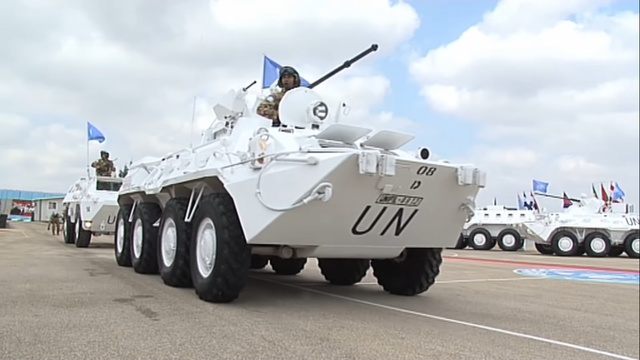As fighting intensifies between Israel and Hezbollah in southern Lebanon, tensions have spilled over to include United Nations peacekeepers stationed in the region. Israeli Energy Minister Eli Cohen publicly criticized the United Nations Interim Force in Lebanon (UNIFIL) on Monday, accusing the peacekeeping mission of being ineffective and calling for its withdrawal from the combat zones.
"The State of Israel will do everything to ensure the safety of its citizens, and if the UN cannot help, at least it should not interfere, and move its personnel from the combat zones," Cohen stated on X (formerly Twitter).
UNIFIL has come under fire, both literally and figuratively, during Israel's military campaign against Hezbollah. Israel has intensified operations in southern Lebanon, targeting Hezbollah's military infrastructure with the declared goal of eliminating threats to Israeli citizens. However, the U.N. peacekeeping force, stationed in the region since 1978, has found itself increasingly caught in the crossfire. On Sunday, the U.N. accused Israeli forces of forcibly entering a U.N. base with tanks, an incident that followed multiple attacks on peacekeeper positions. According to UNIFIL, two Israeli Merkava tanks destroyed the gate of the base and fired shells that caused smoke to spread across the compound, leading to several peacekeepers experiencing skin irritation and respiratory problems.
Prime Minister Benjamin Netanyahu added his voice to the calls for UNIFIL's withdrawal, accusing the peacekeepers of serving as "human shields" for Hezbollah fighters. Netanyahu said Israel regrets any injuries to peacekeepers but suggested that removing them from the combat zone would be the best way to ensure their safety. "We regret the injury to the UNIFIL soldiers, and we are doing everything in our power to prevent this injury. But the simple and obvious way to ensure this is simply to get them out of the danger zone," Netanyahu said in a video addressed to U.N. Secretary-General António Guterres, who has been declared persona non grata in Israel.
The U.N. has pushed back against Israel's claims, with UNIFIL stating that Israeli forces have repeatedly attacked their positions since Israel launched its ground invasion of southern Lebanon. According to UNIFIL, five peacekeepers have been wounded in recent days, with their monitoring capabilities severely hampered due to attacks on watchtowers and communication equipment. In response, U.S. Defense Secretary Lloyd Austin urged Israeli Defense Minister Yoav Gallant to ensure the safety of U.N. personnel, reinforcing the importance of protecting both UNIFIL forces and the Lebanese Armed Forces.
The situation has drawn international concern, particularly from European countries, which contribute a significant number of troops to the peacekeeping force. Italy, France, and Spain have thousands of troops stationed with UNIFIL, and European Union foreign policy chief Josep Borrell condemned the attacks on peacekeepers as "completely unacceptable." Borrell called for Israel to stop targeting U.N. forces and reiterated that the Security Council, not Israel, has authority over UNIFIL's deployment.
Israel, however, has long been critical of UNIFIL, accusing the peacekeeping force of failing to prevent Hezbollah from building up its military presence along the border. During a tour with foreign journalists in southern Lebanon on Sunday, Israeli military officials pointed to Hezbollah tunnel shafts and weapon caches located near U.N. positions. Brigadier General Yiftach Norkin highlighted how Hezbollah operates in close proximity to the U.N., using the tunnels as a base of operations for launching attacks against Israel. "We are actually standing in a military base of Hezbollah very close to the U.N.," Norkin said, pointing to a tunnel shaft less than 200 meters from a U.N. observation post.
Hezbollah, for its part, has denied using peacekeepers as shields. The militant group, backed by Iran, has continued to launch attacks against Israeli military positions, including a drone strike on Sunday that killed four Israeli soldiers and wounded several others. Hezbollah's media office claimed responsibility for the attack, stating it was retaliation for Israeli airstrikes on Beirut last week that killed 22 people. Israeli military officials have since confirmed that Hezbollah's drones targeted a base housing Israel's elite Golani Brigade.
As the conflict drags on, UNIFIL's role in southern Lebanon has become increasingly precarious. While the peacekeeping force's mandate is to monitor the cessation of hostilities, the escalating violence has made it nearly impossible for UNIFIL to carry out its mission. U.N. peacekeeping chief Jean-Pierre Lacroix told the Security Council that the force's ability to patrol the border has been significantly curtailed, and the safety of personnel is in serious jeopardy. Lacroix noted that more than 300 peacekeepers have already been moved from front-line positions to larger bases, and UNIFIL operations have been virtually halted since late September.






